The Benjamin Adams brand is carried exclusively by Sam Ash Music, a large retail chain of music instrument stores in the US. The brand is manufactured for Sam Ash by an undisclosed Chinese manufacturer and the Adams brand name is a ‘made up name’ to sound American, although the pianos are not built here. Building products in China is not a bad thing and in fact, many good products come from and are made in China. Even Yamaha and Kawai have have piano factories in China, but unlike the Adams brand, Kawai & Yamaha make the pianos themselves where Adams/Sam Ash does not. They simply buy an inexpensive model to market and promote in the U.S, and for the the Sam Ash company, its a smart thing to do because it gives them full control and exclusivity over that name.
With that being said, I have not liked the quality, sound, or performance of this digital piano brand in any of the models they have previously put out and I always recommend purchasing the better and more popular brands including Yamaha, Kawai, Casio, Roland, and a couple of others. I have written reviews of some previous Adams models and I did not like these pianos at all, even for their low price. You generally get what you pay for, however I found the DPR1500 ($699 internet price) is much improved over the older models in features and piano tone, so I was pleasantly surprised by that. After having spent a lot of time playing this instrument I was hoping that I could recommend it because it’s very affordable, has some good features, and many people are looking for that kind of thing these days. But unfortunately it has a major flaw that prevents me from recommending this piano and I don’t believe this flaw is something which can be repaired, easily changed, or overlooked.
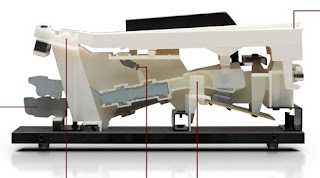 |
| Example of quality digital piano key action |
Here’s the explanation of what I mean by that. All pianos have a key action that goes up and down when you play it and press down on the keys…that’s normal. But when you press down on the keys and then release them to go back up, the only thing you want to hear is the sound of the music and the notes that are being played. You do not want to hear the keys physically making a lot of noise when hitting the bottom keybed (underneath the keys) when you push the keys down, and you don’t want to hear the keys making noise when they go back up. A little ambient noise is normal, but if the noise is too great, it interferes with the music and what is being heard.
On the Adams DPR1500, when the keys are played and pushed down with any real force at all which is normal playing, the amount of physical thumping noise being produced when the keys hit bottom is so loud that is is almost unbearable in my opinion. The only time the noise is at a minimum is when you turn up the piano volume very loud so that you can’t hear the thudding and thunking sound the keys make when being played. But of course you don’t want to play the piano at a very loud volume just to mask the key noise. When you play the piano at a normal or softer volume, which is how it’s mostly used in a home, the thumping noise is much more noticeable and distracting and noise also occurs when the keys come back up to resting position. And when you plug in headphones for private practice, you won’t hear the outside noise as much but everyone else in the house will hear it constantly and it may drive them ‘crazy.’
The MOST important feature and function in any piano is the key action because if it does not work correctly, nothing else really matters including the quality of the piano tone, the amount of sounds there are, the other features that are offered, or the design and attractiveness of the cabinet. Good key actions is one of the main things that separates one piano from another and this is where the Benjamin Adams DPR1500 falls apart (so to speak). You might as well use real hammers to strike the keys because that’s what it sounds like to me when playing this piano. Just because a piano has keys does not mean they work properly or even at a minimum level. If the factory that builds this model fixes the problem or builds a higher quality model, then they may have something good. But until they change what they call their NHA or “New Hammer Action,” I do not recommend this piano even for the lower price of $699. If you happen to see this piano in a Sam Ash store and are able to try one, just turn the piano volume down to a lower level and push on the keys with a medium amount of normal force while increasing that force and then you’ll hear what I’m talking about.
If you want a piano key action that will work properly and much more quietly, then try any of the other popular brands and models including Casio (starting at $799 for the AP220), Yamaha, Kawai, Roland, and Kurzweil. It will be worth spending a little more money on something you can enjoy for many years because then you’ll know that all 88 keys should function properly.
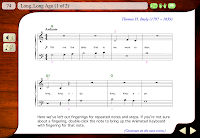 By the way, if at all possible, be sure you try to get a digital piano with a USB computer output on it. The Benjamin Adams does not have this feature but many other pianos do and it can be important because of all the music educational software available for computers and iPads. A ‘Core Compliant’ USB output is best because that automatically can connect with iPad which is what kids are using more and more in schools, at home, and for music practice. Don’t underestimate the fun and the power of what an iPad or laptop computer can do (with the proper software) for a piano student of any age. The availability of exciting interactive piano and music software is amazing and it is something that can help motivate any piano student or recreational player whether they are at a beginner or advanced level. On the left above are examples of educational software available from the eMedia company.
By the way, if at all possible, be sure you try to get a digital piano with a USB computer output on it. The Benjamin Adams does not have this feature but many other pianos do and it can be important because of all the music educational software available for computers and iPads. A ‘Core Compliant’ USB output is best because that automatically can connect with iPad which is what kids are using more and more in schools, at home, and for music practice. Don’t underestimate the fun and the power of what an iPad or laptop computer can do (with the proper software) for a piano student of any age. The availability of exciting interactive piano and music software is amazing and it is something that can help motivate any piano student or recreational player whether they are at a beginner or advanced level. On the left above are examples of educational software available from the eMedia company.
By the way, check out the following review I did on a couple of Casio pianos and related iPad connectivity and music software as an example of what else is available.
For more info on digital pianos and how to get one of these models for LESS, please contact me at tim@azpianowholesale.com or call direct at 602-571-1864
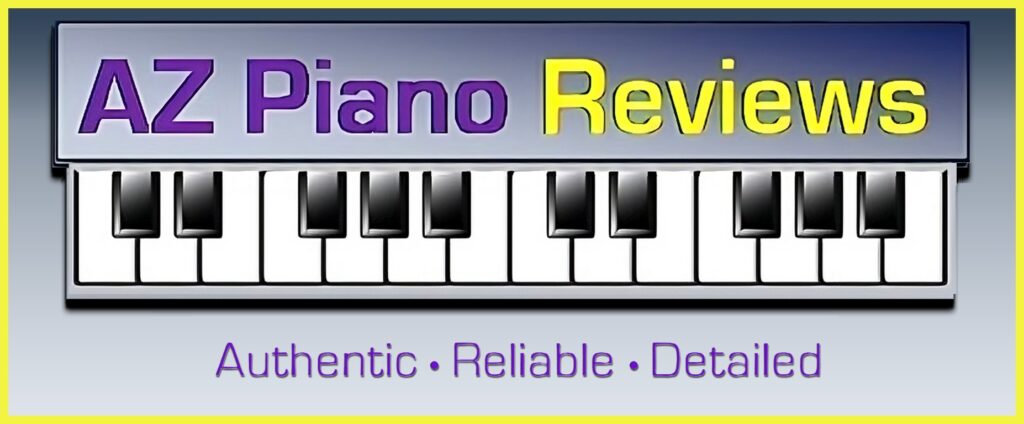


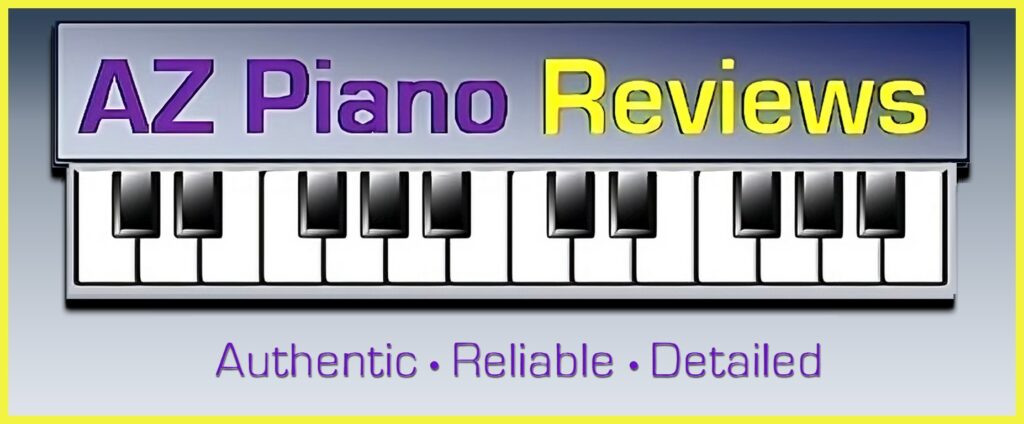

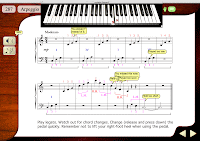





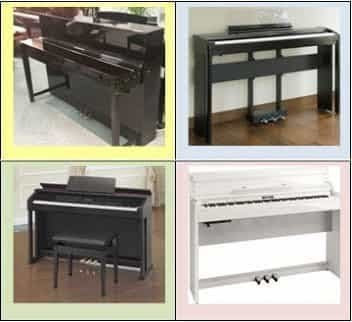


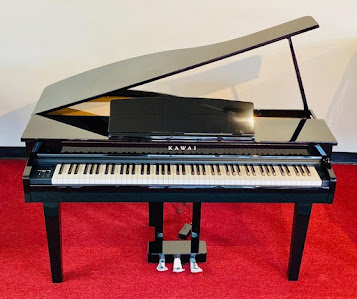
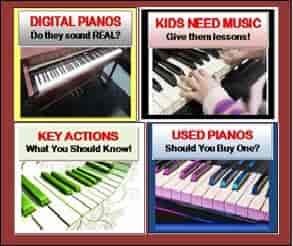
Thanks very much for the review of the Benjamin Adams pianos. I agree completely with what you say. I purchased a DPB800 and my family noticed the excessive action noise immediately (while I was using headphones). In addition to this, the built-in speakers are now wearing out because I've had the volume turned up to try and drown out the noise.
Thanks so much for your research! I also am very aware of all noises & if I got a keyboard with a lot of key release noise it would make playing almost unbearable.
It's been over 20 yrs since I took piano lessons & it didn't cross my mind how valuable computer software could be (noted 'Core Compliant' USB output' reference in article: priceless!
I'll be sure to read all of your articles. Thanks again for helping all of us.